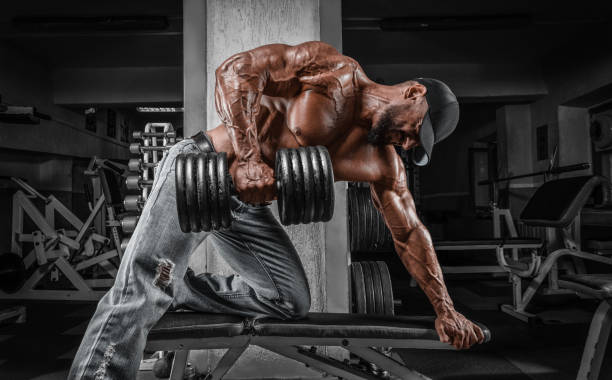Becoming more active can lower both your top and bottom blood pressure numbers. How much lower isn't entirely clear, but studies show reductions from 4 to 12 mm Hg diastolic and 3 to 6 mm Hg systolic. Regular exercise also helps you maintain a healthy weight — another important way to control blood pressure.
Raised Blood Pressure and Bodybuilding

Weight Lifting and Hypertension
It might seem counterintuitive that something as beneficial as weight lifting could make any health conditions worse. But if you have high blood pressure, you may want to talk with your doctor before you increase the intensity of your workouts. Because when it comes to weight lifting and hypertension, there are some things you need to know.
According to the Mayo Clinic, if you have uncontrolled blood pressure that is higher than 180/110 millimeters of mercury (mm Hg), you shouldn't lift weights. That's because resistance training can cause a temporary increase in blood pressure. And depending on how much weight you lift, this increase can be dramatic enough to cause a dangerous spike in your blood pressure.
The American Heart Association (AHA) designates five categories for blood pressure.
- Normal blood pressure is anything below 120/80 mm Hg.
- Elevated blood pressure is a reading of 120 to 129/80 to 89 mm Hg.
- Stage one high blood pressure is a reading of 130 to 139/80 to 89 mm Hg.
- Stage two high blood pressure is a reading greater than 140/90 mm Hg.
- Hypertensive crisis is anything higher than 180/120 mm Hg.
Based on these guidelines for hypertension and the recommendations from the Mayo Clinic, anyone with a high stage two blood pressure or in the hypertensive crisis category should talk to their doctor about resistance training guidelines and hypertension before heading to the weight room.
Resistance Training Guidelines for Hypertension
There's no denying that exercise is good for your heart. It also helps prevent and manage certain health conditions such as high blood pressure, metabolic syndrome, depression and Type 2 diabetes.
Plus, the American College of Sports Medicine reports that individuals with hypertension may experience a 5 to 7 mm Hg reduction in blood pressure if they perform regular aerobic exercise. They also point out that dynamic resistance exercise can reduce blood pressure, similar to aerobic exercise. While a drop of 5 to 7 mm Hg might not seem like a lot, they also point out that it translates to a reduced risk of cardiovascular disease of 20 to 30 percent.
While a reduction in blood pressure — and, consequently, reduced risk of cardiovascular disease — is excellent news, you may still have concerns about bodybuilding and blood pressure. Fortunately, there are some steps you can take to maximize the health benefits of exercise and keep your blood pressure in a safe range.
- In addition to designing a routine that is tailored to your needs, you should always perform exercises with proper form. If your form is compromised, you risk injury, and consequently, you may notice a rise in your blood pressure.
- Along these same lines, the Mayo Clinic suggests lifting lighter weights. While this may be opposite of what a bodybuilding program recommends, heavier weights require more strain, which may cause a spike in your blood pressure.
- And finally, when performing a move, take extra care not to hold your breath. During intense physical activity, a normal reaction to deal with the exertion is to hold your breath. Unfortunately, this can cause dangerous spikes in blood pressure.






